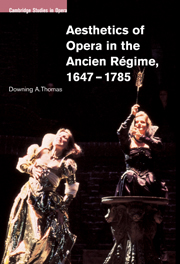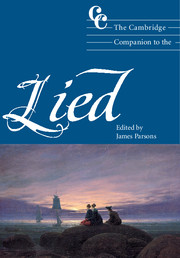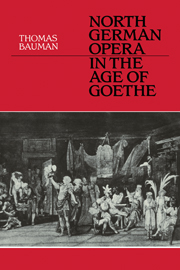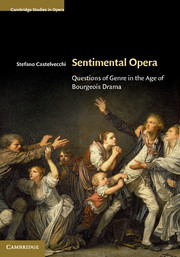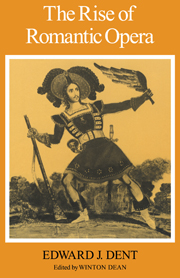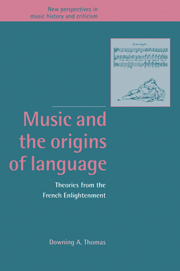Aesthetics of Opera in the Ancien Régime, 1647–1785
This study recognizes the broad impact of opera in early-modern French culture. Downing A. Thomas considers the use of operatic spectacle and music by Louis XIV as a vehicle for absolutism; the resistance of music to the aesthetic and political agendas of the time; and the long-term development of opera in eighteenth-century humanist culture. He argues that French opera moved away from the politics of the absolute monarchy in which it originated to address Enlightenment concerns with sensibility and feeling. The book combines close readings of significant seventeenth-century and eighteenth-century operatic works, circumstantial writings and theoretical works on theatre and opera, together with a measure of reception history. Thomas examines key works by Lully, Rameau and Charpentier, among others, and extends his reach from the late seventeenth century to the end of the eighteenth.
- First study to examine the relationship in close detail of opera to French social and cultural history
- Written by leading scholar of French opera
- Covers period of French history from Louis XIV to the Revolution
Reviews & endorsements
"It goes beyond strict musical analysis and examines these oeuvres and their contexts from a broad cultural perspective, drawing on the writings of contemporary philosophers and commentators." Opera Quarterly
"This book is not an easy read, but any time spent between its covers will be amply rewarded.... a fluently written study that moves smoothly across the decades to become a cultural history of French opera from its origins to the Revolution.... Highly recommended." Choice
"Like a handy toolbox for singers and teachers, Miller's book provides detailed, well-rounded discussions of vocal technique, pedagogical issues, and performance concerns in one place, a rare scenario. As wel, the appendices are excellent for quick reference about vocal repertoire and IPA symbols. A must-have for anyone involved in the vocal field." -- Opera Journal
"Thomas provides an excellent distillation of the conflict between seventeenth-century writers who championed staged tragedy and those who welcomed and defended tragédie en musique. Downing Thomas' book is an important addition to the study of the development of French opera, particularly for its blend of historical, philosophical, cultural, and critical studies." Opera Today, Deborah Kauffman, University of Northern Colorado
"Rather than answering all the questions raised closing off all possibilities, Thomas opens up new insights, draws together interesting primary sources, and engages in dialog with secondary literature from several disciplines." Notes
Product details
February 2009Paperback
9780521100977
420 pages
229 × 152 × 24 mm
0.61kg
9 b/w illus. 13 music examples
Available
Table of Contents
- Introduction
- Part I. French Opera in the Shadow of Tragedy:
- 1. Song as performance and the emergence of French opera
- 2. The opera king
- 3. The ascendance of music and the disintegration of the hero in Armide
- 4. The disruption of poetics I: Medee's excessive voice
- 5. The disruption of poetics II: Hippolyte et Aricie and the reinvention of tragedy
- Part II: Opera and Enlightenment: From Private Sensation to Public Feeling:
- 6. Heart strings
- 7. Music, sympathy, and identification at the Opéra-Comique
- 8. Architectural visions of lyric theater and spectatorship
- 9. Opera and common sense: Lacépède's Poetique de la musique
- Conclusions
- Works Cited
- Index.

